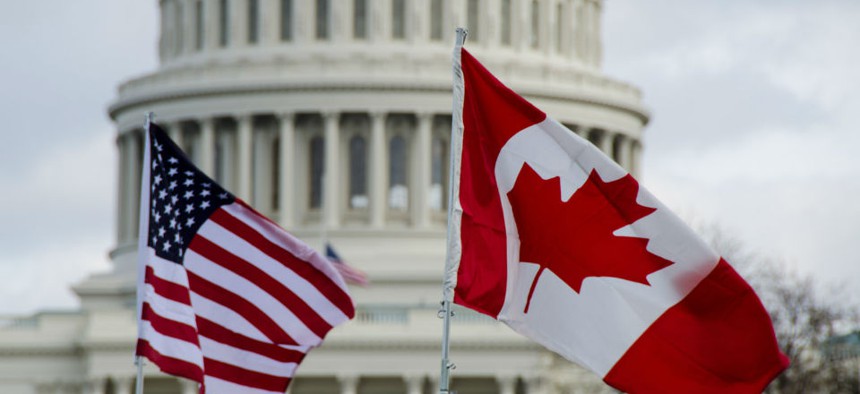
US and Canadian flags at the US Capitol Flickr user Photo Phiend
White House Touts Regulatory Neighborliness With Canada
The goal is to reduce economic barriers.
President Obama’s regulatory point man announced a plan he called a “significant pivot point” in international regulatory cooperation affecting U.S. trade with Canada.
Howard Shelanski, administrator of the Office of Information and Regulatory Affairs, on Friday outlined new “federal agency-level partnership arrangements to help institutionalize the way our regulators work together” in areas ranging from food health inspections to motor vehicle safety to tracking nanotechnology.
The U.S.-Canada Regulatory Cooperation Council Joint Forward Plan “will remove duplicative requirements, develop common standards, and identify potential areas where future regulation may unnecessarily differ,” Shelanski wrote. “This kind of international cooperation on regulations between the United States and Canada will help eliminate barriers to doing business in the United States or with U.S. companies, grow the economy, and create jobs.”
The plan stresses department-to-department activity and transparency for industry shareholders in 29 areas to be addressed in the next three to five years. “Relationships matter for successful international regulatory cooperation, and open communication between colleagues helps establish a trust and rapport that is essential for implementing specific initiatives,” the plan noted. “Regulators must lead the way to create and sustain change; they are the ones doing the work.”
Citing Obama’s 2011 executive order promoting international coordination, Shelanski said, “Working together with our Canadian partners can make government regulations smarter, doing business easier, and consumers safer.”
A more skeptical view came from Amit Narang, regulatory policy advocate for the nonprofit Public Citizen. “We are concerned because past efforts to eliminate ‘unnecessary regulatory differences’ across borders have meant sacrificing important public health and safety protections under the guise of ‘smarter’ regulation,” he told GovExec. “We’ll need to wait for the results to see for sure, but there appears to be no interest in strengthening standards through this effort so that is clearly a missed opportunity.”
(Image via Flickr user Photo Phiend)







